 Editor’s Note: This is the sixth chapter in Volume 2 of Editor Emeritus Donald H. Harrison’s 2022 trilogy, “Schlepping and Schmoozing Along the Interstate 5.” All three books may be purchased from Amazon.com or at any of the lectures that Harrison delivers to groups around the county. Harrison may be contacted via donald.harrison@sdjewishworld.com
Editor’s Note: This is the sixth chapter in Volume 2 of Editor Emeritus Donald H. Harrison’s 2022 trilogy, “Schlepping and Schmoozing Along the Interstate 5.” All three books may be purchased from Amazon.com or at any of the lectures that Harrison delivers to groups around the county. Harrison may be contacted via donald.harrison@sdjewishworld.com
Schlepping and Schmoozing Along the Interstate 5, Vol. 2; Exit 23 B (Balboa Avenue East): San Diego Mesa College
From northbound Interstate 5, take the Balboa Avenue East exit, proceed to a right turn on Genesee Avenue, to a left on Marlesta Drive, a right on Chasewood Drive, and a right onto Mesa Colle Circle to the campus. Address is 7250 Mesa College Drive.
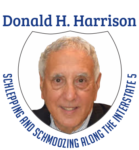 SAN DIEGO — A news release from San Diego Mesa College in late October 2021 announced that it and San Diego City College had just been recognized by the U.S. State Department as being in the top 20 community colleges in the nation that had arranged for Gillman Scholarships for their students to study abroad over the last two decades.
SAN DIEGO — A news release from San Diego Mesa College in late October 2021 announced that it and San Diego City College had just been recognized by the U.S. State Department as being in the top 20 community colleges in the nation that had arranged for Gillman Scholarships for their students to study abroad over the last two decades.
Pamela Luster, Ph.D, the President of San Diego Mesa College, happily commented that “studying internationally opens a wide array of opportunities for our students and helps to broaden their access to rich, unique, and long-lasting learning.” Thirty Mesa College students had won Gilman Scholarships, along with another 53 from San Diego City College.
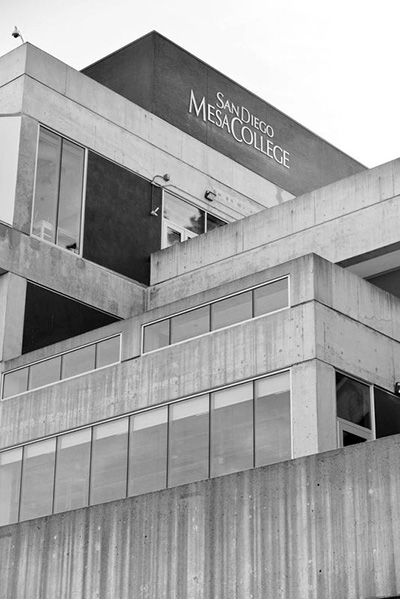
The news release noted that the San Diego Community College District, in which both City and Mesa Colleges are located, views “study abroad as an invaluable option for students living in a diverse border community where international perspectives and global learning can be critical for a successful career. For many students, their college years may be their only opportunity for international learning. Students who have taken part in study abroad programs say their experience helped them expand their global awareness, build valuable job market skills, better adapt to diverse work environments, and experience increased self-confidence.”
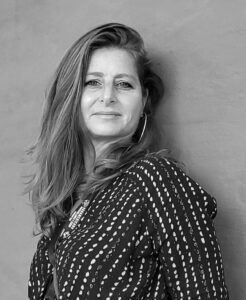
Spanish Professor Dora Schoenbrun-Fernandez, whose hyphenated last name reflects her Ashkenazi Jewish heritage and her husband’s Spanish heritage, serves as the Study Abroad Coordinator on the Mesa campus. Besides preparing students to apply for the Gilman Scholarship of up to $5,000, she also occasionally leads students on trips to such Spanish-speaking countries as Spain, Peru, and Costa Rica. She says that she works hard to publicize the availability of Gilman scholarships and helps the student understand that on their applications they ought to address three issues: What they need to reach their academic goals; how a scholarship would help them academically, and the relationship between the country where they seek to study and the realization of their goals.
In what might be quite a test for any writer, the applications are limited to 1,000 characters – not words, bit characters. Clearly polysyllabic words on such an essay would not be helpful. Schoenbrun-Fernandez says English has plenty of good short words. Among Mesa students who have been successful recently were a student desiring to study different types of architecture in Spain, and a public health student who won the Gilman Scholarship only to be prevented ironically from traveling abroad because of the public health crisis caused by COVID. Other winners have been in such fields as child development and science.
Usually, getting a science student to study abroad is difficult. This is because their course of study for their associate of science degree typically is so demanding that they are afraid to take off the three-to-four-week study-abroad period covered by the scholarship. The same is true for student athletes, Schoenbrun-Fernandez commented. With practices, regular classes, and travel schedules, taking off for that much time may seem difficult or impossible. Yet another group of students who are less likely to travel abroad are new immigrants, whose parents worked very hard to get their families to the United States in the first place. Many of those parents have difficulty understanding the value of going somewhere else, according to Schoenbrun-Fernandez.
Chances are the students who receive the scholarships know only a little about their benefactor, the late Congressman Benjamin A. Gilman, a Republican from New York and a member of the Jewish community. Towards the end of his congressional career, he urged his colleagues “to defray eligible study- or intern-abroad costs,” according to the website of the Gilman International Scholarship Program. “These costs include program tuition, room and board, books, local transportation, insurance, international airfare, passport and visa fees.”
Inaugurated in 2001, the Gilman International Scholarships were designed for “supporting undergraduates who might not otherwise participate due to financial constraints.” It was intended to help students “who have been historically underrepresented in education abroad, including but not limited to first-generation college students, ethnic minority students, students with disabilities, students attending Historically Black Colleges and Universities or other minority-serving institutions, students attending community colleges [such as San Diego Mesa and San Diego City] and students coming from U.S. states with less study-abroad participation.”
Creation of the Gilman Scholarship was a natural extension of the congressman’s work. “One of the great strengths of our nation is diversity,” he once told a reporter. “As individuals, we should reach out to those in our community who have different religious, ethnic, cultural, or racial backgrounds.”
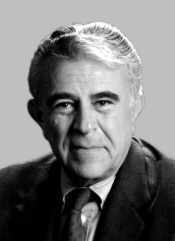
Gilman served for 30 years in Congress before deciding to retire from public life. For six of those years, he served as chairman of the House International Relations Committee, which is better known today as the House Foreign Affairs Committee.
The Holocaust personally impacted Gilman in 1933 when he was a boy of 11, he told a writer for Freedom magazine. After Adolf Hitler and his Nazi party took power, he traveled with his father, Harry Gilman, from the U.S. to Berlin “to try to persuade my aunt, my father’s sister, to come and live in the States and bring her children.” Unfortunately, his aunt decided to remain in Germany, later perishing with her children in the Holocaust. An indelible memory for Gilman from that trip was watching “storm troopers already marching in the streets, painting signs on the Jewish shops and on housing … My father gave me an opportunity to take it all in.”
The experience was the impetus for Gilman’s long career as an advocate for human rights. He was celebrated by his co-religionists in the Jewish community, who recalled that in 1989 through 1991, he chaired a House Task Force on the Emigration of Soviet Jewry. In 1993, he was appointed as a member of the U.S. Holocaust Memorial Council. Gilman received many awards including a “Tree of Life” Award from Temple Sinai in his hometown of Middletown, New York; a “Defender of Israel” award given to him by the Christians’ Israel Public Action Campaign and an honorary degree from Yeshiva University. He also received the American Israel Friendship Medal and the Theodor Herzl Award in recognition of his work promoting Zionism, Israel, and Soviet Jewry.
In 1978, Gilman negotiated a prisoner exchange in which the U.S. released a Soviet spy for an Israeli who was imprisoned in Mozambique, which then was a Soviet ally. Reporting that transaction in its 2016 obituary of Gilman, The New York Times noted that in message exchanges with Israel, Gilman’s code name was “Uncle Ben,” a play on a popular brand of rice. A fee years later, Gilman visited Jacobo Timmerman in his jail cell, helping to focus international attention on the plight of the Jewish Argentine journalist, who eventually was released.
However, it was not just with Jews that Gilman shared his heart. Over several years, Gilman negotiated U.S. prisoner exchanges that resulted in freedom for an American who had tried to smuggle East Germans out of their country, as well as for 30 U.S. citizens held by Fidel Castro’s government in Cuba. In 1981, while serving as a congressional delegate to the United Nations, under U.S. Ambassador Jeanne Kirkpatrick, Gilman worked to relieve famine in Ukraine, and participated in conferences on U.S. relations with Mexico and with European nations.
Gilman also co-chaired an Ad Hoc Committee on Irish Affairs, building on progress made in the 1970s by constituents in his district covering New York’s suburban Rockland and Orange Counties. Through Project Children, they invited Irish Catholic and Irish Protestant children between the ages of 10 and 14 to enjoy summer hospitality with host families, away from the interreligious strife. Project Children later expanded to bring young adults from foreign countries to serve as interns in business and various levels of government, including congressional offices. Graduate school scholarships were established in Gilman’s honor both in Belfast, Northern Ireland, and Limerick, Ireland.
His wide-ranging international interests additionally saw him advocating for Tibet in its quest for independence from China, prompting the Dalai Lama in 2003, following Gilman’s retirement, to present him with a “Light of Truth” Award.
The late Congressman Tom Lantos, D-California, who was the only Holocaust survivor to serve in Congress, described Gilman: “Ben is one of Congress’ strongest champions of human rights. Throughout his career, he has fought tirelessly to protect the freedoms we cherish for the world’s downtrodden and persecuted.”
Gilman was indefatigable in reaching out to the less fortunate. In response to an appeal from singer Harry Chapin, he authored legislation creating the Presidential Commission Against Hunger, and later Congress’s own Select Committee on Hunger. He also chaired a task force seeking repatriation for prisoners of war held by Vietnam and information about the missing in action. He also cofounded a House Select Committee on Narcotics.
Many organizations in addition to the Jewish ones already mentioned saluted Gilman’s service in the Congress. He was awarded the National VFW Medal of Merit; a “Man of the Year Award” by Citizens for Clean Government; a certificate of appreciation from the President’s Mental Retardation Commission, and a Distinguished Service Award for his efforts on behalf of the aged and disabled. He also was named a “Man of the Year” by the Hudson Delaware Boy Scout Council and given an “Americanism” award from the Westchester American Legion. In addition, he was awarded the “Peace Through Strength” award from the American Security Council, and the Distinguished Service Medal from the New York Grand Lodge of Masons.
Other honors included the Pericles Award from the American Hellenic Educational Progressive Association; the Thomas Jefferson Award from Food Distribution International, and a medal from the Respect the Law Conference.
Even before entering Congress, Gilman had already distinguished himself. During World War II, he served as a staff sergeant in the 19th Bomb Group of the 20th Army Air Force. He flew 35 missions over Japan, earning a Distinguished Flying Cross and an Air Medal with Oak Leaf clusters. In 1946, he graduated with a BS in economics from the Wharton School of Business at the University of Pennsylvania, and four years later received a law degree from New York Law School in the Tribeca neighborhood of New York City. After practicing law as a New York assistant attorney general, he served in the New York State Assembly from 1968 to 1972. His election to Congress came in November 1972. Taking office in January 1973, he served there until January 2003. New York’s population dropped in the 2000 census, which led to redistricting. His district was divided among four surrounding districts. Gilman thought briefly of running again, but then decided against it, retiring at age 80 as the then-oldest Republican in the House of Representatives.
![]()
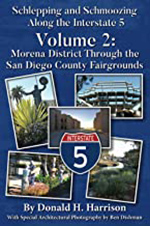 Gilman donated his papers and memorabilia to the State University of New York (SUNY) at Orange, which also serves as Orange County Community College. The University created the Gilman Center for International Education in his honor. At the entryway of the Center is a ring of flagpoles, “with each flagpole carrying the colors of a country in which Gilman served or helped foster strong international relations on behalf of the United States,” according to the college’s website.
Gilman donated his papers and memorabilia to the State University of New York (SUNY) at Orange, which also serves as Orange County Community College. The University created the Gilman Center for International Education in his honor. At the entryway of the Center is a ring of flagpoles, “with each flagpole carrying the colors of a country in which Gilman served or helped foster strong international relations on behalf of the United States,” according to the college’s website.
“Throughout the Gilman Center’s interior, suitable spaces are allocated to showcase research papers, artwork, memorabilia and other items from Gilman’s time in Washington as well as from his travels abroad. The college offers an associate in arts degree in international studies under auspices of its Global Studies Department.
*
Donald H. Harrison is editor emeritus of San Diego Jewish World. He may be contacted via donald.harrison@sdjewishworld.com